Bingchang Liu
Code Graph Model (CGM): A Graph-Integrated Large Language Model for Repository-Level Software Engineering Tasks
May 22, 2025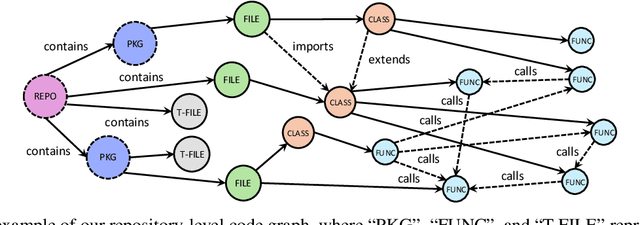
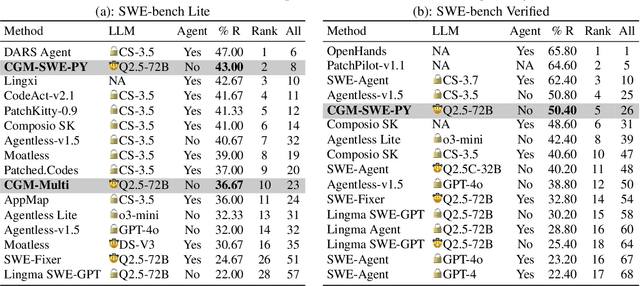

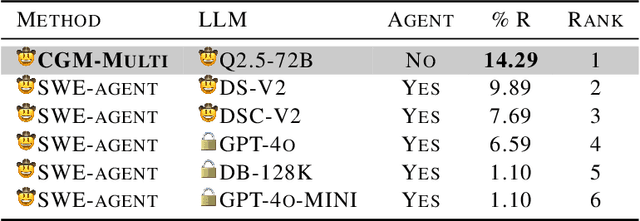
Abstract:Recent advances in Large Language Models (LLMs) have shown promise in function-level code generation, yet repository-level software engineering tasks remain challenging. Current solutions predominantly rely on proprietary LLM agents, which introduce unpredictability and limit accessibility, raising concerns about data privacy and model customization. This paper investigates whether open-source LLMs can effectively address repository-level tasks without requiring agent-based approaches. We demonstrate this is possible by enabling LLMs to comprehend functions and files within codebases through their semantic information and structural dependencies. To this end, we introduce Code Graph Models (CGMs), which integrate repository code graph structures into the LLM's attention mechanism and map node attributes to the LLM's input space using a specialized adapter. When combined with an agentless graph RAG framework, our approach achieves a 43.00% resolution rate on the SWE-bench Lite benchmark using the open-source Qwen2.5-72B model. This performance ranks first among open weight models, second among methods with open-source systems, and eighth overall, surpassing the previous best open-source model-based method by 12.33%.
CoBa: Convergence Balancer for Multitask Finetuning of Large Language Models
Oct 09, 2024Abstract:Multi-task learning (MTL) benefits the fine-tuning of large language models (LLMs) by providing a single model with improved performance and generalization ability across tasks, presenting a resource-efficient alternative to developing separate models for each task. Yet, existing MTL strategies for LLMs often fall short by either being computationally intensive or failing to ensure simultaneous task convergence. This paper presents CoBa, a new MTL approach designed to effectively manage task convergence balance with minimal computational overhead. Utilizing Relative Convergence Scores (RCS), Absolute Convergence Scores (ACS), and a Divergence Factor (DF), CoBa dynamically adjusts task weights during the training process, ensuring that the validation loss of all tasks progress towards convergence at an even pace while mitigating the issue of individual task divergence. The results of our experiments involving three disparate datasets underscore that this approach not only fosters equilibrium in task improvement but enhances the LLMs' performance by up to 13% relative to the second-best baselines. Code is open-sourced at https://github.com/codefuse-ai/MFTCoder.
A Survey on Language Models for Code
Nov 19, 2023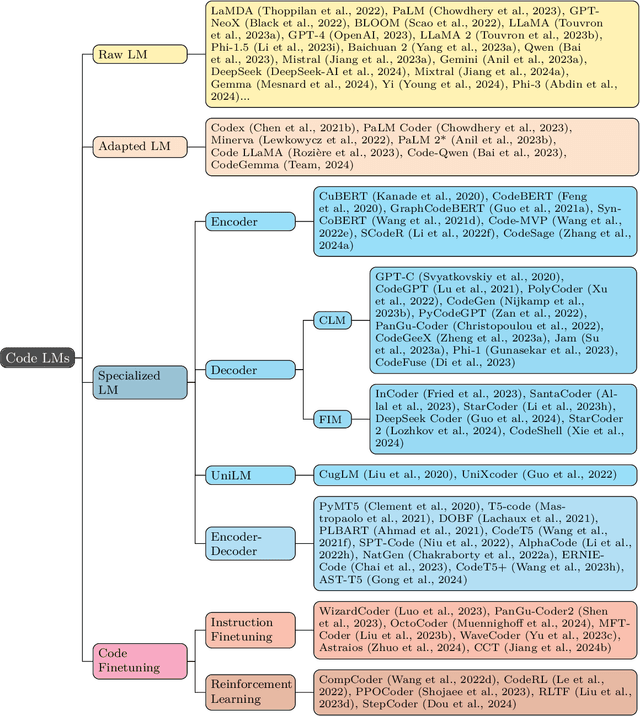
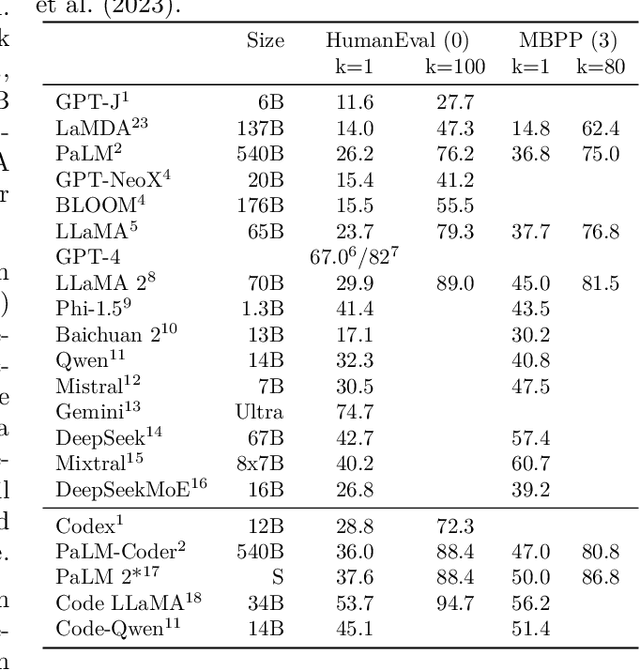
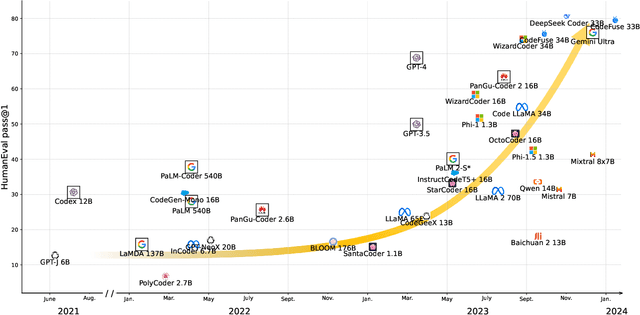
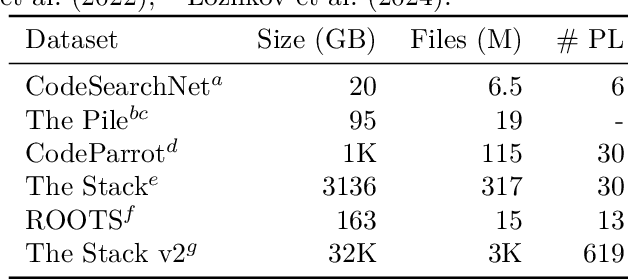
Abstract:In this work we systematically review the recent advancements in code processing with language models, covering 50+ models, 30+ evaluation tasks, 150+ datasets, and 550 related works. We break down code processing models into general language models represented by the GPT family and specialized models that are specifically pretrained on code, often with tailored objectives. We discuss the relations and differences between these models, and highlight the historical transition of code modeling from statistical models and RNNs to pretrained Transformers and LLMs, which is exactly the same course that had been taken by NLP. We also discuss code-specific features such as AST, CFG, and unit tests, along with their application in training code language models, and identify key challenges and potential future directions in this domain. We keep the survey open and updated on GitHub repository at https://github.com/codefuse-ai/Awesome-Code-LLM.
MFTCoder: Boosting Code LLMs with Multitask Fine-Tuning
Nov 04, 2023Abstract:Code LLMs have emerged as a specialized research field, with remarkable studies dedicated to enhancing model's coding capabilities through fine-tuning on pre-trained models. Previous fine-tuning approaches were typically tailored to specific downstream tasks or scenarios, which meant separate fine-tuning for each task, requiring extensive training resources and posing challenges in terms of deployment and maintenance. Furthermore, these approaches failed to leverage the inherent interconnectedness among different code-related tasks. To overcome these limitations, we present a multi-task fine-tuning framework, MFTcoder, that enables simultaneous and parallel fine-tuning on multiple tasks. By incorporating various loss functions, we effectively address common challenges in multi-task learning, such as data imbalance, varying difficulty levels, and inconsistent convergence speeds. Extensive experiments have conclusively demonstrated that our multi-task fine-tuning approach outperforms both individual fine-tuning on single tasks and fine-tuning on a mixed ensemble of tasks. Moreover, MFTcoder offers efficient training capabilities, including efficient data tokenization modes and PEFT fine-tuning, resulting in significantly improved speed compared to traditional fine-tuning methods. MFTcoder seamlessly integrates with several mainstream open-source LLMs, such as CodeLLama and Qwen. Leveraging the CodeLLama foundation, our MFTcoder fine-tuned model, \textsc{CodeFuse-CodeLLama-34B}, achieves an impressive pass@1 score of 74.4\% on the HumaneEval benchmark, surpassing GPT-4 performance (67\%, zero-shot). MFTCoder is open-sourced at \url{https://github.com/codefuse-ai/MFTCOder}
CodeFuse-13B: A Pretrained Multi-lingual Code Large Language Model
Oct 10, 2023Abstract:Code Large Language Models (Code LLMs) have gained significant attention in the industry due to their wide applications in the full lifecycle of software engineering. However, the effectiveness of existing models in understanding non-English inputs for multi-lingual code-related tasks is still far from well studied. This paper introduces CodeFuse-13B, an open-sourced pre-trained code LLM. It is specifically designed for code-related tasks with both English and Chinese prompts and supports over 40 programming languages. CodeFuse achieves its effectiveness by utilizing a high quality pre-training dataset that is carefully filtered by program analyzers and optimized during the training process. Extensive experiments are conducted using real-world usage scenarios, the industry-standard benchmark HumanEval-x, and the specially designed CodeFuseEval for Chinese prompts. To assess the effectiveness of CodeFuse, we actively collected valuable human feedback from the AntGroup's software development process where CodeFuse has been successfully deployed. The results demonstrate that CodeFuse-13B achieves a HumanEval pass@1 score of 37.10%, positioning it as one of the top multi-lingual code LLMs with similar parameter sizes. In practical scenarios, such as code generation, code translation, code comments, and testcase generation, CodeFuse performs better than other models when confronted with Chinese prompts.
 Add to Chrome
Add to Chrome Add to Firefox
Add to Firefox Add to Edge
Add to Edge